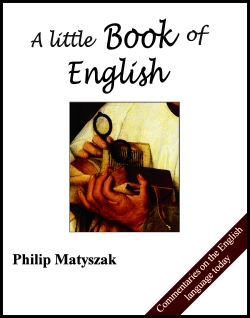|
The earlier Prof blog entries as well as some new articles are now available as a Kindle book from Amazon. We hope you enjoy it.

amazon.com amazon.co.uk
|
| 15 July 2022 | | English in Colour | 'He was too green to realize that things were not as black as they looked, and was tickled pink to find that things looked rosy. He had been too yellow to find out for himself and had spent the whole week feeling blue because he thought he was in the red while he can actually spend his golden years in the black.'
Humans do not only see colours better than most animals but also, as demonstrated by the above quote, we also think in colour. Colour is a sort of shorthand for describing things (e.g. 'The blue' for the sky or sea, and the 'Green' for a village common), and also for feelings, situations and even professions. Think of the 'Boys in Blue' (police), white coats (medicine and science) and our men and women in khaki (the army – even though khaki is seldom worn in the modern military.)
When looking at babies, we expect pink to symbolize girls and blue to do this for boys, even though a century and a half ago, these colours were reversed, and little girls wore blue. Sometimes colours have a double role. Someone who is 'green' may be green with envy or alternatively new and inexperienced. The latter meeting goes back at least to Shakespeare who has a character say 'That was in my salad days – I was greener then'. These days being 'green' can also mean that one is environmentally aware. So an inexperienced member of an environmentalist party who is feeling jealous might be described as a 'green green green'.
Being 'red' can mean a host of things – angry, embarrassed or of a socialist inclination politically - except in the USA where leftish Democrats are blue and right-wing Republicans are red. A problem with defining things by colour is that it sorts things into hard-and-fast categories, when even colours are graduated. As a result people see – for example - race relations in literally black-and-white terms, when in fact we are all various shades of pink and brown. | | | | | 15 May 2022 | | London's history in names | What most people today call 'London' is in fact shorthand for a settlement on the River Thames which has expanded to take in what were once totally separate communities. The original 'London' still exists today in what Londoners simply call 'The city' – the financial district centred around St Pauls cathedral, where there has been a settlement since pre-Roman times. In fact the name of London is Celtic – Lynn Dunn 'The hillfort by the lake'.
Other names of the conurbation now known as London give clues to their origin. Places ending in '-ham' were originally Saxon settlements centred around a nobleman's hall. Lords Cloppa and Dacca for example gave us Clapham and Dagenham, while Feltham comes not from a nobleman but from a field (feld).
Places ending in '-ton' were clearings in the forest. Padda's ton gives us Paddington, and Kingston is self-explanatory. The same 'don' that gives us the 'don' in London also named Wimbledon and Croydon – (Crocus Hill). Similar geographic designations can be found in Brockley (Brock is 'badger' and lea is 'field') and Golder's Green. Golder was originally a 14th century individual called Godyere. One of his near-contemporaries, Mr Waendle gave us Wandsworth, and a salt mine on a river bank gives us Greenwich ('wich' is an old name for a salt mine).
Some names only make sense when you know their origins. 'Barking' has nothing to do with dogs, but comes from the local birch trees (Bereca), and the Isle of Dogs was the more sensible Isle of Ducks until the local accent mangled it.
In short, to take a bus ride across London is to find a fascinating diversity of names and place – all buried today under row upon row of Victorian red-brick housing. | | | | | 15 March 2022 | | Evolution at speed |
All languages evolve. Which is odd when you think about it, because no-one doubts that Shakespeare was capable of expressing himself pretty well. So all we really need, one would think, is to update our vocabulary to accommodate things like space shuttles and actions like texting. Yet that's not how it works. Language keeps evolving and not always for the better.
These days we tend to say 'less' when we mean 'fewer'. Also sentences these days tend to contain less words than the hundred-word efforts of some Victorian writers. It is not uncommon to find emphatic sentences of Just. One. Word. Talking of 'one', the impersonal 'one' has been replaced by 'you' – these days you hardly ever hear people using 'one' as a pronoun. These changes make English less accurate and more confusing.
On the other hand, some changes are simply the fading away of stylistic rules that did not make a lot of sense in the first place. Why not split infinitives? Some infinitives deserve to be split and indeed, to be comprehensively split. Putting an adverb right before the main verb gives the sentence extra heft, as the makers of 'Star Trek' well knew when they wrote 'To boldly go …'. While we are at it, let's keep starting sentences with conjunctions and finishing them off with prepositions. Why not?
Starting a sentence with 'But ..' makes perfect sense if you are continuing a thought from the previous sentence, especially if we are going to eschew the hundred-word sentences of our forebears. And in the words of one famous writer 'Not ending a sentence with a preposition is a nonsense up with which I will not put.'
Also btw it is becoming common to put acronyms so as to finish sentences asap. This is still considered bad style, but imao the world of social media txtspk will bring the stylistic purists around soon enough.
| | | | | 15 January 2022 | | Indian roots | Every language borrows words from other languages. Linguists call these 'loan words', though as one commentator famously remarked, 'English does not borrow words, it takes innocent languages down a dark alley and mugs them.'
In fact this sentence proves its own point, as the verb 'to mug' is itself a loan word. It comes from a type of Indian crocodile with the nasty habit of waiting by a ford for victims to attempt to cross the river. This beast was known as a 'mugger', and given the '-er' which looks like suffix, the back-formation of the verb 'to mug' was a logical step.
In fact English has enthusiastically mugged Indian languages for a number of words, to the extent that the Oxford English Dictionary lists almost a thousand of them. Not unexpectedly many of these words describe the profound influence of India on the English diet. 'Pepper' from the Indic 'pippari' has been kicking around for thousands of years, but modern additions include 'chutney', 'papadum', 'mango' and of course, 'curry'.
Houses have also benefited from India, especially the bungalow, from the Gujarati 'bangalo' for a one-storey house, and the verandah. 'Verandah' has an interesting history, as the British in India didn't get it from the natives but the Portuguese in India, and the word has since been enthusiastically adopted by the French whose southern climate is anyway more adapted for the things than soggy England.
While stealing 'verandah' from the Indian Portuguese, the English also took 'mandarin' a word we now more associate with China, but which has the root of 'mandare', the Latin for 'command'. Once the word 'mandarin' was transferred to Chinese officials, the deep orange robes worn by these men led to similarly coloured fruit being called 'mandarins'.
We can also thank India for shampoo, cashmere, bandanna, yoga, polo, pyjamas, lilac and jute. And if a mugger took your loot ('lut' – Hindi), was it the thug ('thag' – Marathi) or karma (Sanskrit)? | | | | | 15 Novemver 2021 | | That Doesn't Mean What They Think It Does | 'When I heard that, my head literally exploded.' Either the speaker of that last statement belongs to an alien race or he was speaking from beyond the grave. To “literally” make a head explode requires something like a stick of dynamite inserted into the speaker's mouth. (Something which some exasperated grammarians are probably tempted to do.)
The most famous mis-speaker of all time is the fictional Mrs Malaprop, who notoriously misused words that she thought made her sound more educated and intelligent. However, it is interesting to see that modern journalists and celebrities are hastening to catch up. (The opening statement was by a particularly annoying celeb whose cerebral vacuity puts him at greater risk of implosion.)
While correct use of English has never been a requirement for fame, one would hope that journalists would do better – words are their trade after all. Yet these are the folk who supply 'factoids' in the belief that these are extra little snippets of factual information. However a factoid is properly defined as something that sounds like a fact, but actually is not. (Making some of these usages more accurate than the journalists may realize.)
Also scientists would prefer if over-excited reporters did not refer to their breakthroughs as a 'quantum leap', since a quantum leap is actually the smallest movement that can happen and still be described as such. And again, computer journalists reporting on new software often refer to a 'steep learning curve' as though it were a bad thing, rather than a graph showing amount of learning on the Y curve against time on the X. It is not a hill that you have to climb, folks. It's more like education taking off.
Which would be a good thing.
| | | |
page 1 page 2 page 3 page 4 page 5 page 6 page 7 page 8 page 9 page 10 page 11 page 12 page 13 page 14 page 15 page 16 page 17 |
|
|

